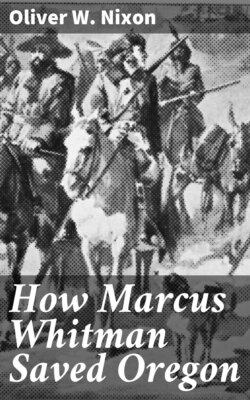Читать книгу How Marcus Whitman Saved Oregon - Oliver W. Nixon - Страница 7
На сайте Литреса книга снята с продажи.
ОглавлениеFALLS OF THE WILLAMETTE.
This much of the well-nigh forgotten history we have thought appropriate to note in this connection; first, because of the new light given to it from the recent disclosures made; and, second, to call attention to the fact that a second time, forty-three years later, it served a valiant purpose in thwarting English ambition and serving America's highest interests.
Estimated from the standpoint of money and material values, it was a great transaction, especially notable in view of existing conditions, but from the standpoint of State and National grandeur, carrying with it peace and hope and happiness to millions, and continuous rule of the Republic from ocean to ocean, it assumes a greatness never surpassed in a single transaction, and not easily over-estimated, and never in the history of the English people did a single transaction, with dates so widely separated, arise, and so effectually check their imperious demands.
The American Republic may well remember with deep gratitude President Jefferson, and the far-seeing statesmen who rallied to his call and consummated the grand work. They can at the same time see the foresight and wisdom of Jefferson in, at once, the very next year, sending the expedition of Lewis and Clarke to the headwaters of the Columbia River, and causing a complete survey to be made to its mouth. It was a complete refutation of the claim of the English Commissioners, in 1837, that while "Captain Gray only discovered the mouth of the river, Captain Vancouver made a complete survey." The American mistake was, not in the purchase and active work then done, but the lassitude and inexcusable neglect in the forty subsequent years which imperiled every interest the Republic held in the territory beyond the Rocky Mountains.
When the treaty of 1846 was signed, it was hoped that the questions at issue were settled forever; but the Hudson Bay Company was slow to surrender its grasp on any of the territory it could hold, and especially one so rich in all materials that constituted its wealth and power.
The treaty of 1846 between the United States and Great Britain read:
"From the point on the 49th parallel to the middle of the channel which separates the continent from Vancouver's Island and thence southerly through the middle of said channel and of the Fuca Straits, to the Pacific Ocean, provided, however, that the navigation of such channel and straits south of the latitude 49 degrees remain free and open to both parties."
This led to after trouble and much ill feeling. The passage referred to in the treaty is about seven miles wide, between the archipelago and Vancouver Island. The archipelago is made up of half a dozen principal islands, and many smaller ones. The largest island, San Juan, contained about 50,000 acres, and the Hudson Bay Company, knowing something of its value, had taken possession, and proposed to hold it. The legislature of Oregon, however, included it in Island County by an act of 1852, which passed to the Territory of Washington in 1853 by the division of Oregon. In 1854 the Collector of Customs for the Puget Sound came in conflict with the Hudson Bay authorities and a lively row was raised.
The Hudson Bay Company raised the English flag and the collector as promptly landed and raised the Stars and Stripes. There was a constant contention between the United States and State authorities, and the Hudson Bay people, in which the latter were worsted, until in 1856–7, after much correspondence, both governments appointed a commission to settle the difficulty. Then followed years of discussion which grew from time to time warlike, but there was no settlement of the points in dispute.
In December, 1860, the British Government tired of the contest, proposed arbitration by one of the European powers and named either the Swiss Republic, Denmark or Belgium. Then followed the war of the Rebellion and America had no time to reach the case until 1868–9, when the whole matter was referred to two commissioners from each government and the boundary to be determined by the President of the General Council of the Swiss Republic.
This proposition was defeated and afterward in 1871 the whole matter was left to the decision of the Emperor of Germany. He made the award to the United States on all points of dispute in October, 1872, and thus ended the long contest over the boundary line between the two countries, after more than half a century's bickering.
